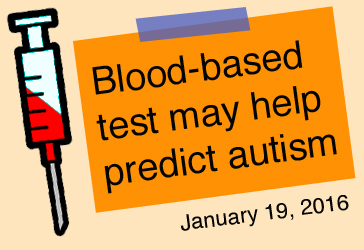Check out other stories from the Latest News
Possible Blood Biomarker for ASD in Children Found
By Chelsea E. Toledo, M.A. on January 19, 2016

Background: Early intervention in children with autism spectrum disorder (ASD) is known to improve behavioral outcomes. Biomarkers – such as proteins in the blood or patterns of activity in the brain – may help identify children with the disorder earlier in infancy, allowing for earlier intervention. Currently, physicians do not have reliable biomarkers to use in the clinic to predict the onset of ASD in children.
What’s New: On January 14, 2016, the journal Scientific Reports published a study that detailed a possible biomarker in the blood of children with ASD. The researchers compared the blood serum from 74 boys between 2 and 10 years old with ASD, 60 of their typically developing peers, and 53 adult males between 40 and 75 years old. Using a large collection of synthetic chemical chains made in the laboratory, they found that one chain in particular, called ASD1, bound to a serum antibody with far greater frequency in typically developing boys than in those with ASD. Interestingly, the results with the ASD children resembled those of the older male group. This difference in activity allowed the researchers to identify ASD cases with 66 percent accuracy.
Why it’s important: This study builds on previous research that suggests that the immune system is different in people with ASD. Immune activity in children with ASD may resemble that of older individuals. According to the authors, measurements with ASD1, in combination with other blood-based measurements (such as hormone levels), could lead to a blood test for ASD with higher predictive accuracy for clinical use.
Help me understand :
| Source(s) : |
| Tweet |

